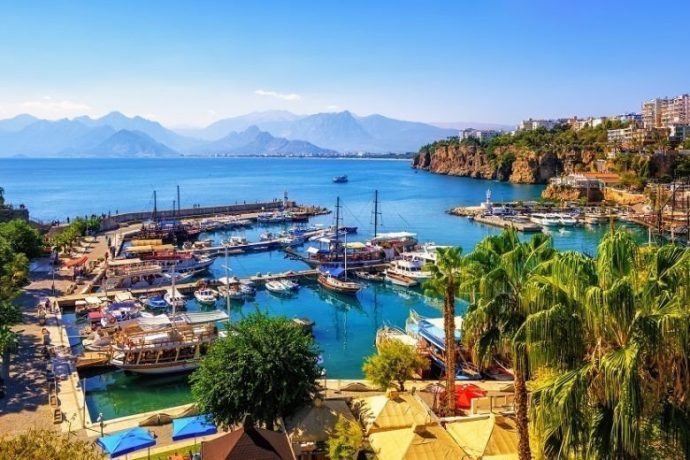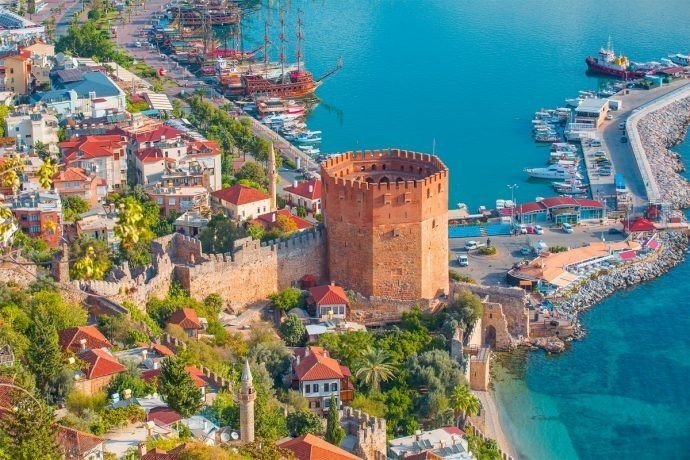There are few places in the world as blessed with natural wonders as Antalya – and that’s not an exaggeration. A beautiful Mediterranean seacoast, sandy beaches, snowy mountains, sand dunes, canyons and forests, all in just one region.
This, of course, was not left unnoticed by people. Antalya is a magnet for tourists, seasonal “nomads” and those looking to resettle (both locals and expats).
Below is the list of five steps that would greatly help you with the search for a perfect home in Antalya.

1. Learning about Antalya
Let’s go through some quick facts.
Antalya is a Mediterranean province in southwestern Turkey and its capital is the city of the same name, which encompasses five of the 19 provincial districts. With the population of nearly 2.5 million Antalya is the fifth largest Turkish province by the number of residents, the population of the city, meanwhile, is around one million.
The province is also home to roughly 100,000 expats, which is not surprising considering the fact that Antalya is the second most popular Turkish province for foreign property buyers after Istanbul.
Data shows that over the last five years every fifth home sold to a foreigner in Turkey was located in Antalya. The province, which has around 300 sunny days per year, attracts many people from traditionally colder countries – Russians, Kazakhs and Germans compromise the top three. The interest is also high from various places in Africa, Asia and South America.

2. Scouting Antalya by areas
Turkey is a country whose modern day diversity has been forged for centuries. This is also inherent to nearly every province, and Antalya is no exception.
As mentioned before, Antalya is divided into 19 districts, outside the metropolitan area the most well-known are tourist hotspots, including Kaş, Manavgat, Alanya and Kemer. Each of these districts can differ from one another in terms of lifestyles and demographics among other things.
Knowing your potential new neighbors is rather important when scouting areas to buy a property, because, well, you aren’t buying a place on an uninhabited island. A very handy tool to help you make an informed decision is Zingat’s data-driven Area Report.
This district-based report shows detailed demographic data on the area’s residents, including their age groups, marital status and education level based on latest degree, i.e. middle school, high school, university, etc.
Perhaps the most important part of the Area Report is the “socio-economic conditions” of the area which are given a letter grade by Zingat’s experts.
The letter grades for areas are granted based on these factors:
• Livability: Accounts for population, housing density, accessibility to health care and public transportation, crime level and life satisfaction data.
• Welfare level: Based on sale and rental values
• Cultural level: Calculated according to residents’ education level and number of cultural facilities.
The Zingat Area Report with its detailed data and carefully prepared letter grades eliminates a fair amount of hardship that comes with being a foreigner trying to buy a house, especially remotely. There’s a Turkish saying that goes, “Don’t get a house, get a neighbor,” because when purchasing a property people you are going to live side by side with are as important as apartment’s floor area or the kitchen system, for example.

3. Using real estate websites
Considering that we are living in the 2020s now, the first place to look for a property to buy is naturally the internet whether it’s abroad or not. And given how little resources are needed to launch a website nowadays your search page will be flooded with tons of sites screaming they know what you need.
Such oversaturation may complicate your search, but if you are reading this text you landed in the right place.
Firstly, Zingat is an easy-to-navigate resource that boasts a miscellaneous collection of property listings. Upon embarking on this journey of trying to buy a house in Turkey, you probably have at least a vague picture of what property you seek. Using Zingat you will see that what you are looking for is a reality.
Secondly, given what’s at stake buying a house is a big decision, a decision best taken with as much available information as possible. In recognition of that, Zingat provides an abundance of unique data and metrics you need in your search of a dream home, including the aforementioned demographics and socio-economic conditions data from the Zingat Area Report as well as current market situation and trends.
And finally, you need a someone you can trust. As such Zingat only works with professional and well-established real estate agents who look to make the purchase process as simple and as efficient as possible.
Together these factors make up Zingat’s spot on motto, “Property. Information. Trust.”

4. Online tour of the property
Modern times allow us to access services unseen a mere decade ago. One of these is getting a detailed tour of an apartment you consider buying from thousands of kilometers away without getting up from a couch.
With the help of the professionals Zingat works with you can see exactly what the property you would be purchasing looks like without ever stepping foot in Antalya or anywhere else in Turkey.

5. Getting familiar with the buying process
Foreigners buying property anywhere in the world are usually susceptible to overpaying as they enter, well, a foreign market. But with trusted resources and unbiased information available via Zingat you can avoid that.
Here you can access current and past average market values, trends, year-based average rate of investment return, etc. to make sure there is no room for overpaying.
You should also know that haggling is a natural part of the property market. It is expected and considered a norm, so there is a fair share that can be knocked off the original price.
In terms of additional expenses when already buying a property, there are a few but they won’t exceed 3-4% of the agreed price.
There are official payments such as processing and title deed fees. The title deed fee (“tapu harcı” in Turkish) is 4% of the property’s price and by law should be split evenly between the seller and the buyer, i.e. 2% each. Either party can voluntarily agree to pay more than their share and, for example, pay the entire 4%.
There are also expenses associated with getting the required documentation package ready.
Before the transfer of ownership the property must be examined by an inspector who will make sure the value is appropriate. This would cost around 2,000 Turkish liras. Foreigners must submit a notarized translation of their passport or other acceptable ID document. If you don’t speak Turkish and are present during the transfer of ownership you must also be accompanied by a certified translator.








